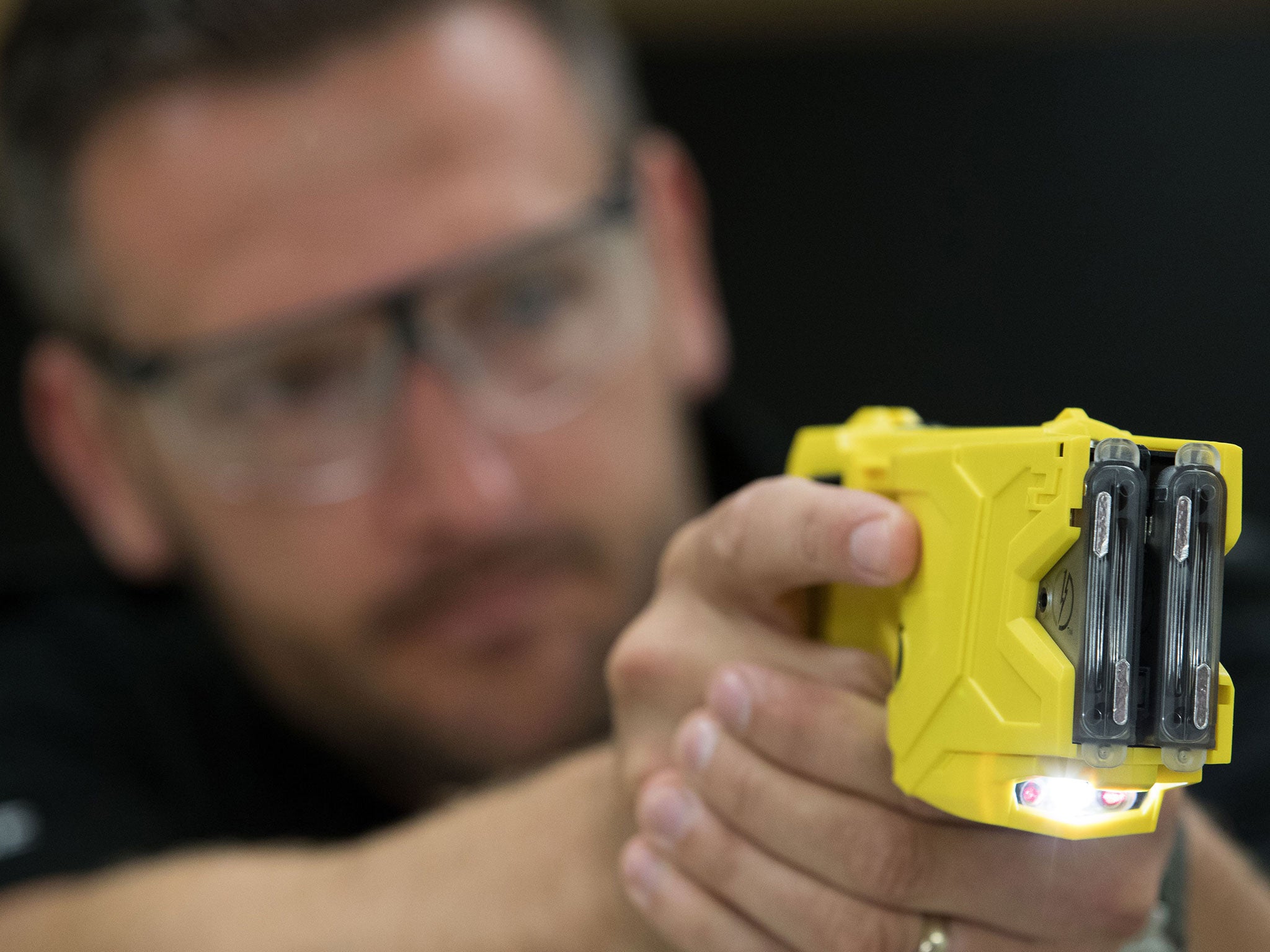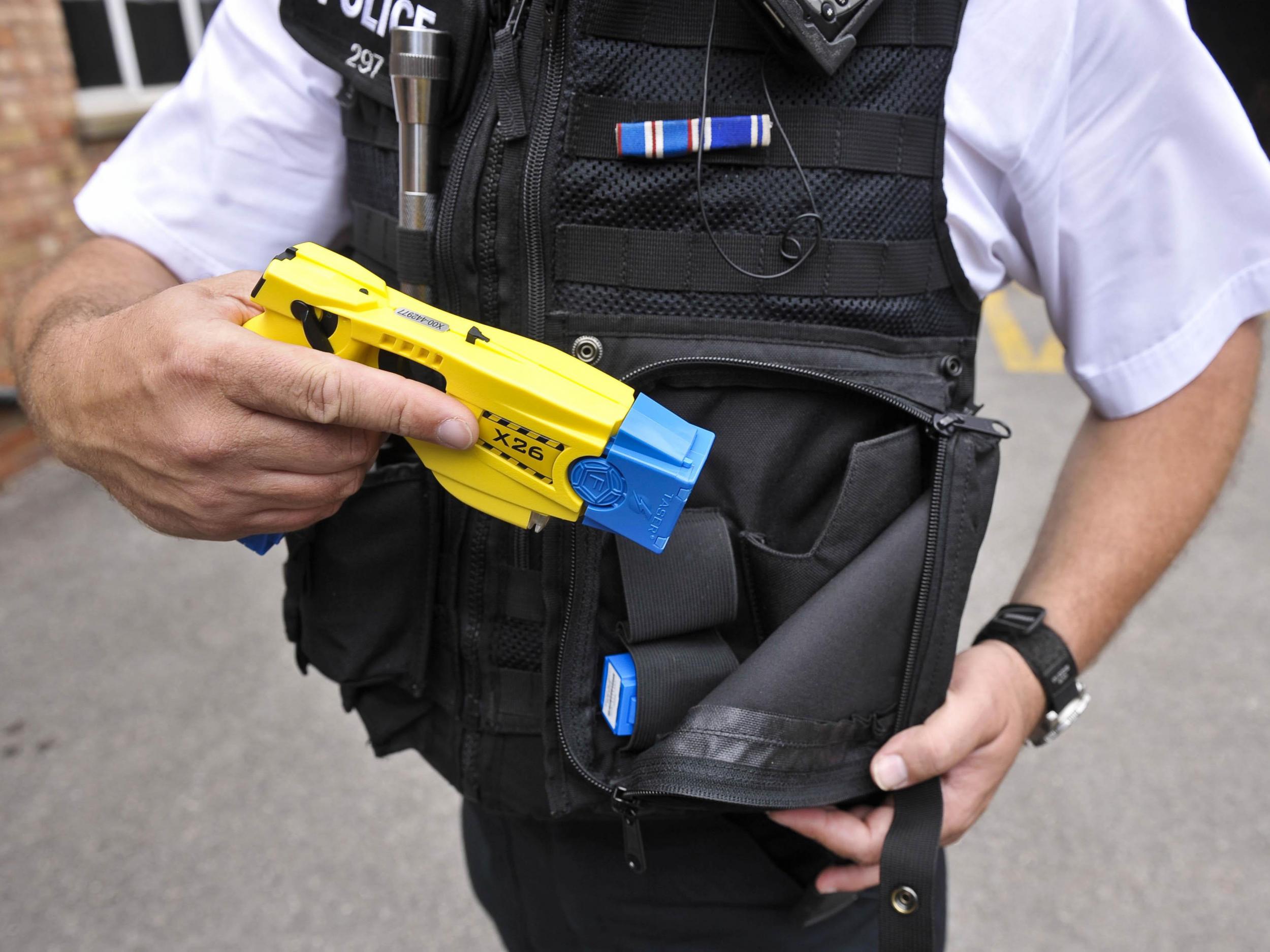Tasers to be given to 10,000 more police officers in England and Wales
But chiefs say weapons are ‘not the answer to all violent or threatening situations’

More than 10,000 extra police officers across the country are to be armed with Tasers.
The Home Office said it was making £10m available to increase the number of trained and equipped officers following violent attacks where officers have been hit by cars and stabbed.
But ministers were accused of risking an “escalation of violence” by funding more stun guns for bobbies on the beat.
Human rights campaigners slammed the announcement as a “knee-jerk” reaction to rising attacks on officers, and said it could put public safety at risk.
The National Police Chiefs’ Council (NPCC) has not completed research on how best to protect officers and said Tasers were “not the answer to all violent or threatening situations”.
But the Police Federation, which represents rank-and-file officers, said they should be available to those who want them, and can save lives.
Priti Patel, the home secretary, said: “I’ve been completely appalled by the recent spate of serious assaults on police officers, which is why I’m giving chief constables the resources to dramatically increase the number of their officers who carry Tasers.
“They keep us safe and now I’m giving them what they need to keep themselves safe on the job.”
Tasers, which peak at 50,000V and reach a 25ft range, are currently carried by around a third of the 123,000 police officers in England and Wales.
Officials said the funding would allow at least 10,000 more to be armed after attending a required three-day training course.
Human rights group Liberty said the announcement marked a shift to “policing by control, while sacrificing policing by consent”.
Rosalind Comyn, policy and campaigns officer, added: “Tasers can and do kill. They are deployed disproportionately against people of colour and people experiencing mental health issues, and have alarmingly been used against children under 11.
“Arming every officer will normalise the use of Taser in routine police encounters, which risks escalating, rather than reducing, violence on our streets and will further corrode the fractured relationship between police and the communities they serve.
“These weapons should only be in the hands of specialist firearms officers.”
The Children’s Rights Alliance for England, part of Just for Kids Law, called the announcement “alarming”, saying Tasers could cause psychological suffering as well as physical harm and even fatalities.

“The government should listen to experts and senior police officers and ensure this equipment is only used as an absolute last resort,” said director Louise King.
The Police Federation, which represents rank-and-file officers in England and Wales, has long campaigned for more Tasers but any increase has to be implemented by the leaders of each regional force.
Chair John Apter said: “Officers are telling me daily they are feeling vulnerable and often isolated due to the lack of this vital protective equipment which has saved the lives and prevented serious injuries - this is why I felt so strongly that all officers who want to be trained and carry Tasers should be able to.”
He wrote to the home secretary last month calling for the government to provide ring-fenced funding, but the request was not granted in the spending review and was originally planned to be announced at next week’s Conservative Party conference.
The NPCC is looking at whether Tasers would help protect officers, in an urgent safety review that was launched earlier this month.
Chair Martin Hewitt QPM said: “Taser is an important tactical option for officers but is not the answer to all violent or threatening situations. Its use is regulated by strict standards and is conditional on the completion of a rigorous training programme. Forces across the country are already increasing the number of Taser-trained officers.
“Decisions on the deployment of Taser are part of the operational responsibilities of chief constables and their decisions are based on the assessment of the particular threat, risk and harm within their force area.”
Support for the weapons among police chiefs varies, with some fearing that their increased use damages public relations and undermines the unarmed nature of British policing.
“It is a very powerful bit of kit, it’s also potentially very dangerous,” Dame Cressida Dick said last week.
The proportion of officers that would take up the offer of a Taser is unclear. Police are routinely given handcuffs, batons, body armour and CS spray.

A recent Police Federation survey found 94 per cent of respondents wanted Tasers issued to more frontline officers, but 20 per cent of Metropolitan Police officers in an internal questionnaire said they would not want one.
Tasers were originally introduced as a “less lethal weapon” for firearms officers in 2003, but police leaders acknowledge that the remit has widened.
Campaigners have argued against their use on people suffering mental health crises, and the weapons have been linked to several deaths.
Police recorded mental health as a factor in 14 per cent of Taser incidents.
Instances of Taser use rose by 50 per cent in 2017-18, with the main reasons being protection or detaining a suspect.
The vast majority of the 17,000 times where Tasers were drawn or used resulted in arrests – but 950 people were hospitalised and 750 were detained under the Mental Health Act.
Tasers were not actually fired in 85 per cent of the incidents.
Sophie Khan, a solicitor who represents victims of Taser-related injuries, told The Independent the weapons could kill suspects.
“There have been really serious incidents with Tasers being used on people suffering a mental health crisis,” she added. “The bar has been lowered.”
There are questions over what effect Tasers have on suspects’ behaviour, following a study that found officers visibly carrying them were more likely to be attacked because they “stimulate aggression”.
Katy Bourne OBE, chair of the Association of Police and Crime Commissioners (APCC), said Taser use must be “proportionate, lawful and accountable”.
Martyn Underhill, the APCC’s lead for use of force, said: “We have a long-established principle of policing by consent in this country, so it is important that the public continues to be consulted on any changes to police deployment of this nature.
“We also want to work with our policing partners to ensure that there is a robust evidence base around increased use of Taser and the corresponding impact on the number of assaults on police officers.”
Join our commenting forum
Join thought-provoking conversations, follow other Independent readers and see their replies
Comments
Bookmark popover
Removed from bookmarks